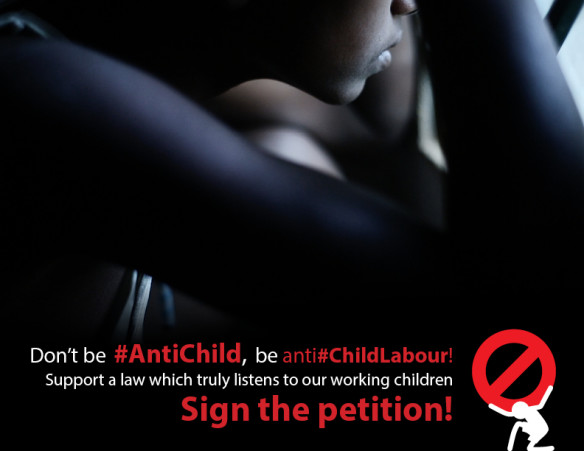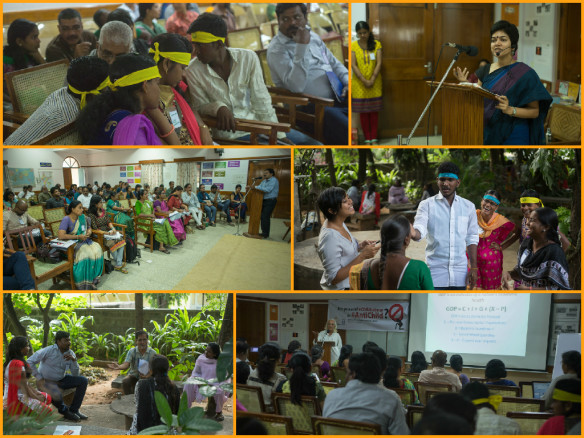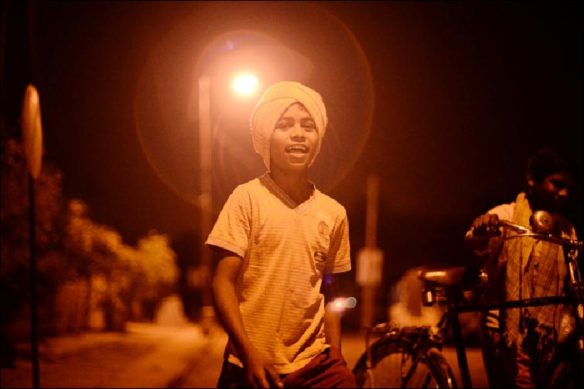Are you anti #childlabour or #antichild?
Posted on May 29, 2015
It has been 30 years since the Child Labour (Prohibition and regulation) Act, 1986 was passed. The recently Cabinet approved Child Labour Amendment Bill, 2012 continues further down its path of tightening prohibition and regulation with some exemptions. The Gurupadaswamy Committee, which informed the Child Labour Law in the 80s, asserted: “Extreme poverty, lack of opportunity for gainful employment and intermittancy of income and low standards of living are the main reasons for the wide prevalence of child labour”. The Law was supposed to combine prohibition and regulation alongside a multiple policy approach to end hazardous child work.
Yet, as a community of practitioners, thirty years down the road we continue to see a large number of children undertaking work which is dangerous for them. In the name of ‘rescue’ our children are being subjected to extreme trauma and institutionalised with little or no option but to return to the same or more dangerous work on release. Figures from the Census, claimed to be dropping, tell us an incomplete truth of the number of children engaging in work. Education is being suggested as the simplistic solution to the ‘problem of child labour’ yet the Bill addresses in no manner the fact that the experience of institutionalized education for marginalized children has been far from positive.
Much has happened and changed since 1986. A larger more nuanced conversation around child work and rights has been building up internationally and nationally. To open these debates in the context of India and to begin a fresh conversation on a child labour law which is child rights centric and informed by children’s experiences, latest research and understanding of child work, join us on our campaign – Are you anti #childlabour or #antichild?
https://www.facebook.com/workingchildren
https://twitter.com/workingchildren
On this page:
Sign our petition to stop Members of Parliament from passing the ineffectual Child Labour Bill
It has been thirty years since the Child Labour (Prohibition and Regulation) Act 1986 was passed, and yet the issue of child labour remains unresolved. The current law, with its simplified approach of a mere ban enacted through the raid and rescue methodology, has not succeeded in improving the lives of working children so far. The ban does not address why children undertake harmful work and nor does it provide children with positive and sustainable long term solutions. Instead the current process of ‘raid and rescue’ ends up deeply traumatising and harming children.
The Child Labour Amendment Bill 2012 follows the same path as the Act and continues to neglect important questions such as why children work and why has the law failed them so far. Therefore, we reject the Bill and demand a comprehensive review of existing child labour laws where:
- The reasons why children work are addressed;
- The childrens right to be heard is acknowledged and spaces created for them to qualitatively participate in a conversation that directly affects them;
- A child rights centric approach embedded in India’s commitment to the UN Convention on the Rights of Child (UNCRC) informs a new approach;
- New research and methodology is incorporated into an informed discussion for a progressive law which responds to children’s needs, for both, the short and the long term.
Assert your support for a law which truly listens to our working children: Sign the petition !
Full report of our national consultation ‘Are you anti #ChildLabour or #AntiChild?’
Under the banner of our ‘Are you anti #ChildLabour or #AntiChild?’ campaign we organised a national consultation on the 14th of July at Ashirwad, Bangalore, to discuss questions and concerns around the recent child labour approach and the proposed Amendments to the Child Labour Act. The event was attended by 57 participants, representing 27 organisations working in the field of child rights. With the screening of CWC’s docu-drama ‘Banned Aid’ about children’s negative experiences with the procedure of raid and rescue, the presentations of prominent speakers -Dunu Roy (Hazards Centre Delhi), Khusboo Jain (social activist), Christopher Williams (International Justice Mission), Fr. Edward Thomas (former chairperson KSCPCR) and Arlene Manohoran (Centre for Child and Law) and the presentations of the children representatives from working children’s unions -Bhima Sangha, Chiguru, Hasira Sangha and Vidiyal, several aspects of the child labour debate were discussed. The participants agreed on the various dilemma’s surrounding child labour and that a more democratic evidence based approach is required for a child rights friendly law which truly supports working children.
- Download the full report of the event here: NationalConsultationReport14th_270715_TheConcernedForWorkingChildren
- Read the press release of the event
- Listen to the live recordings of the speakers
The Concerned for Working Children speaks
Since 1985, The Concerned for Working Children has been asking that the issue of child labour be approached from the perspective of the children. Why do they engage in hazardous work? What are the imperatives of being induced to do such work? What are their experiences and understanding of work from their unique contexts? How can we create a law that addresses their needs?
Below are the important responses shared by us on the child labour debate:
– Have we asked the children? (The Hindu, 13 June 2015)
– Press Release – Need of the hour: A repeal and re-enactment of the Child Labour Law
– Child labour law amendment: Much work to be done (Economic Times, 15 May 2015)
– Child Labour Hatao or Child Labour Chupao? (CWC Newsletter, April 2015)
– Blanket ban on child labour will hit right to livelihood (Deccan Herald, 4 September 2012)
– A total ban on children (CWC Paper by Nandana Reddy, 2012)
CWCs Documentaries on child labour
This is the narrative of a little shepherd boy that urges one to question the state of rural poor in India and the policies that have been put in place to “better” their conditions, especially those of working children.
Taking Destiny Into Their Hands
Taking Destiny in their Hands is a film of hope and a call for clarity as it documents the relevance of the International Movement for Working Children and the central themes that it addresses. It gives viewers a rare opportunity to listen to children’s analyses of global problems, their strategies to overcome them and their call to adults and policy-makers to give them due credit as social actors.
Brave Young World shows the children’s perspective of the meaning participation of children. The movie shows the children’s eagerness and need to be part of the decision making processes concerning their lives and how they are able to do this in a eloquent and sensitive matter. The Concerned for Working Children facilitated the children, by collectivising them and negotiating for political spaces for the children, so that children can be part of the decisions that are about their lives. This movie gives its viewers a chance to see the process of children’s participation at local, regional and international level.
Banned-Aid: No exploitation in the name of protection!
Why do children work? How has the current child labour law, articulated through the partial ban, affected them? What happens to children during raids and after they are ‘rescued’ by the government? The docu-drama entitled ‘Banned-aid’ is a collaboration with members of the Bhima Sangha (Union of Working Children) to explore and respond to some of such important questions which currently remain unanswered. The stories shared are real incidents as experienced by working children themselves. The enactment and voice-over have also been undertaken by the sangha members. The docu-drama gives an important insight into why listening to children is a non-negotiable to address child labour in the long-term.
From the Pages of Working Children’s History
This sections does a short listing of the milestones from the International Working Group on Child Labour (IWGCL) and the International Movement of Working Children (IMWC) alongside listing important documents and sites for further readings.
List of relevant readings on the above history:
Discussion Paper: Have we asked the children? by the International Working Group on Child Labour?
This discussion paper of the International Working Group on Child Labour explores how children can be included in the child labour debate, which is theirs by right according to the CRC. The paper argues how understanding of children’s work is defined by adults, without taking into account the realities children live in and how they perceive those realities. Laws and policies from an adult perspective, without the children’s views, failed to be holistic and child-centred. The International Working Group on Child Labour argues how children should be seen as protagonists who, once organised and collectivised, can demand and establish their rights both as children and workers.
The International Movement of Working Children by Nandana Reddy
Nandana Reddy writes from her experiences as the chairperson of the International Working Group on Child Labour about the International Movement of Working Children. Reddy discusses how the international movement was able to participate in a meaningful way, which made the debate more nuanced and contextual. The paper narrates the story, the beginning and end, of the international movement where it explores how dominant discourses on child labour, pushed by powerful stakeholders, affected to possibility of working children to participate in the child labour debate.
Basic resources
Lists the history, law and other relevant and related documents/ articles related to child labour in India.






[…] particular good campaign this year is being delivered by the Concerned for Working Children « Are you anti #childlabour or #antichild?” In our campaign against #ChildLabour let us ensure we are not #AntiChild. The campaign […]
Highly laudable initiative from the CWC..nuanced approach to child labour issue is the need of the hour..
We need to protect the children.If we dont do it who will?